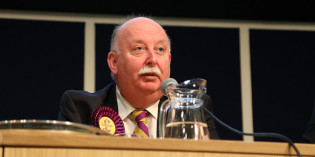Achieving accountable government

The delay in appointing a new Intelligence and Security Committee threatens to undermine its work before it has even begun
In February of this year, the then-Chair of the Intelligence and Security Committee (ISC) – the body which oversees the UK’s three main intelligence agencies – was caught in a journalistic sting operation. Since then, the ISC seems to have been inactive. It is now two months since the General Election and the Government (who […]

Making the breakthrough into Parliament boosts the electoral success of smaller political parties
Establishing the impact of legislative representation on parties’ subsequent electoral outcomes is very difficult due to how different parliamentary and non-parliamentary parties look. To address this problem, Elias Dinas, Pedro Riera and Nasos Roussias used an element that is quite common in multiparty systems – that is, legal thresholds of representation at the national level- and […]

Only an approach founded on rights and obligations can allow for effective and legitimate public infrastructure provision
On Monday 23 March 2015, Dialogue by Design and the UCL Transport Institute co-hosted a seminar, We Need to Talk about Infrastructure, chaired by Jim Steer of Steer Davies Gleave. We posed a simple question: when Government plans to invest £375 billion in infrastructure projects up to 2020, how can this be done with local […]

The Government’s new EVEL timeline still isn’t sufficient to facilitate the necessary debate and deliberation
In the immediate aftermath of Scotland’s vote to remain in the United Kingdom, the Prime Minister David Cameron proposed removing the rights of Scottish MPs to vote on ‘English only’ issues – a process which would be contemporaneous with the granting of new powers for Scotland. Katie Boyle argues that there are at least three […]

Would Brexit spell the end of European defence?
Alongside France, the UK is generally viewed as one of the most important actors in EU defence policy. Karen E. Smith assesses what impact the UK leaving the EU might have in the area of defence. She writes that a Brexit would not spell the end for common European defence as a whole, particularly given […]

The potential for public dialogue and deliberation in the development of national infrastructure policy
Infrastructure spending has come under the microscope recently, with projects like the creation of a new high speed rail line, and the mooted expansion of Heathrow Airport showing the difficulty of persuading everyone of the merit of the project in question. Ian Thompson asks whether it is possible to have genuine public deliberation on a […]

Politicians should embrace the radicalism of Freedom of Information, else they may end up regretting it
The Freedom of Information Act was introduced by Tony Blair’s first Labour government, something which the former Prime Minister now regrets. His new-found scepticism has been echoed by the new Justice Secretary, Michael Gove, who has proposed limiting its reach. Ben Worthy argues that politicians should embrace the full radicalism of Freedom of Information, rather […]

Interview: Peter Parycek and Noella Edelmann on digital democracy best practice, localism, and e-government
Does democracy have a digital future? At a recent conference at Danube University in Krems, Austria, Sean Kippin asked the co-Chairs of the recent digital democracy and e-government conference (CEDEM) – Peter Parycek and Noella Edelmann – whether politicians were capable of making the necessary transition to digital, what the implications were localism, and which countries […]

‘Depoliticising infrastructure’: can a strategic approach enhance public engagement?
In a recent seminar co-hosted by Dialogue by Design and the UCL Transport Institute a simple question was posed: when Government plans to invest £375 billion in infrastructure projects up to 2020, how can this be done with local communities, rather than against them? Here Morgan Wild discusses the prospects for depoliticising infrastructure, the challenges this raises for democratic accountability […]



 Democratic Audit's core funding is provided by the Joseph Rowntree Charitable Trust. Additional funding is provided by the London School of Economics.
Democratic Audit's core funding is provided by the Joseph Rowntree Charitable Trust. Additional funding is provided by the London School of Economics.